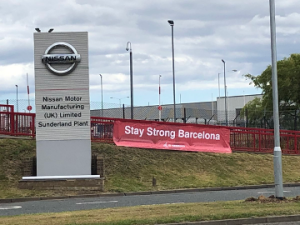Nissan redundancies
 As the overproduction crisis continues to hit the auto industry worldwide, Japanese carmaker Nissan is planning £2.3bn worth of cuts globally by laying off workers, intensifying the work of the remaining staff and closing down plants. When the company announced the closure of its Barcelona operation, it seemed that this might save its Sunderland plant, but since then management have raised a question mark over that too.
As the overproduction crisis continues to hit the auto industry worldwide, Japanese carmaker Nissan is planning £2.3bn worth of cuts globally by laying off workers, intensifying the work of the remaining staff and closing down plants. When the company announced the closure of its Barcelona operation, it seemed that this might save its Sunderland plant, but since then management have raised a question mark over that too.
Nissan is trying to sap the resistance of workers to this global threat by using the Covid lockdown as a smokescreen, hoping that everyone will just shrug and blame the health emergency for the crisis. The bosses hope thereby to encourage a mood of passivity in the workforce. But Nissan workers worldwide know all too well that the world market for cars was reaching saturation point long before Covid struck, thanks to the anarchy of production under capitalist commodity production, and that things will only get worse post-Covid.
Nissan is trying to distract British workers in particular by pointing to Brexit as the supposed cause of all their woes. Yet the fate of Nissan’s Barcelona plant suggests that membership of the EU is no more likely to improve the situation for workers in Spain than has been the case in Greece. Nissan is trying to blackmail British workers into renouncing their referendum decision, threatening to pull the plug on operations in the North East in the event of a No Deal Brexit.
Nissan is deliberately leaving Sunderland workers dangling, plunged into uncertainty over their future. Recently the company announced that 248 temporary workers were to be sacked, cutting manpower to the bone. Nissan also pressed on with their plan to replace the existing final salary pension scheme with a much inferior Defined Contribution scheme, sparking a 500-strong protest at the main gate of the Sunderland plant. 2,000 workers will be affected by this pensions rip-off.
Efforts by Nissan to weaken and divide working class resistance by playing off one section of workers against another are not going unchallenged by workers. At the Sunderland protest a cheering banner was raised sending the message ‘Stay Strong Barcelona’.
The Sunderland plant, Britain’s largest single car factory, is able to make 600,000 cars a year. Yet the last time it produced even 500,000 was back in 2016, because the world market cannot absorb that quantity of commodities. Nissan will ruthlessly cut capacity and drive down labour costs in the battle to dominate the shrinking market. And it will seek to locate its factories in those countries which offer the best incentives in the way of tax waivers, subsidies and other sweeteners. In this way monopoly capital not only plays off worker against worker, but also pits one national government against another.
Big businesses like Nissan hate Brexit because they fear that leaving the EU will create impediments to the free movement of capital, making it harder to transfer operations from country to country at the drop of a hat, abandoning entire workforces in the process.
It is futile for governments to try to bribe and cajole outfits like Nissan into granting a stay of execution. Instead, factories like the one in Sunderland need to come into public ownership, contributing to the reindustrialisation of Britain, as a first step in the direction of a planned socialist economy.